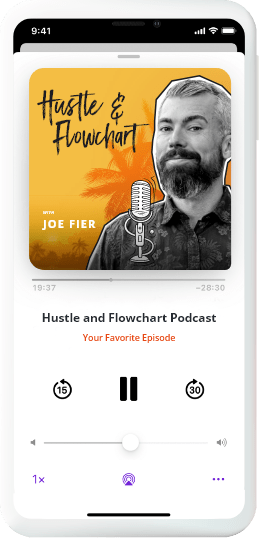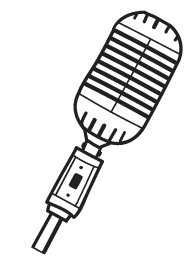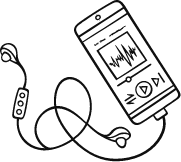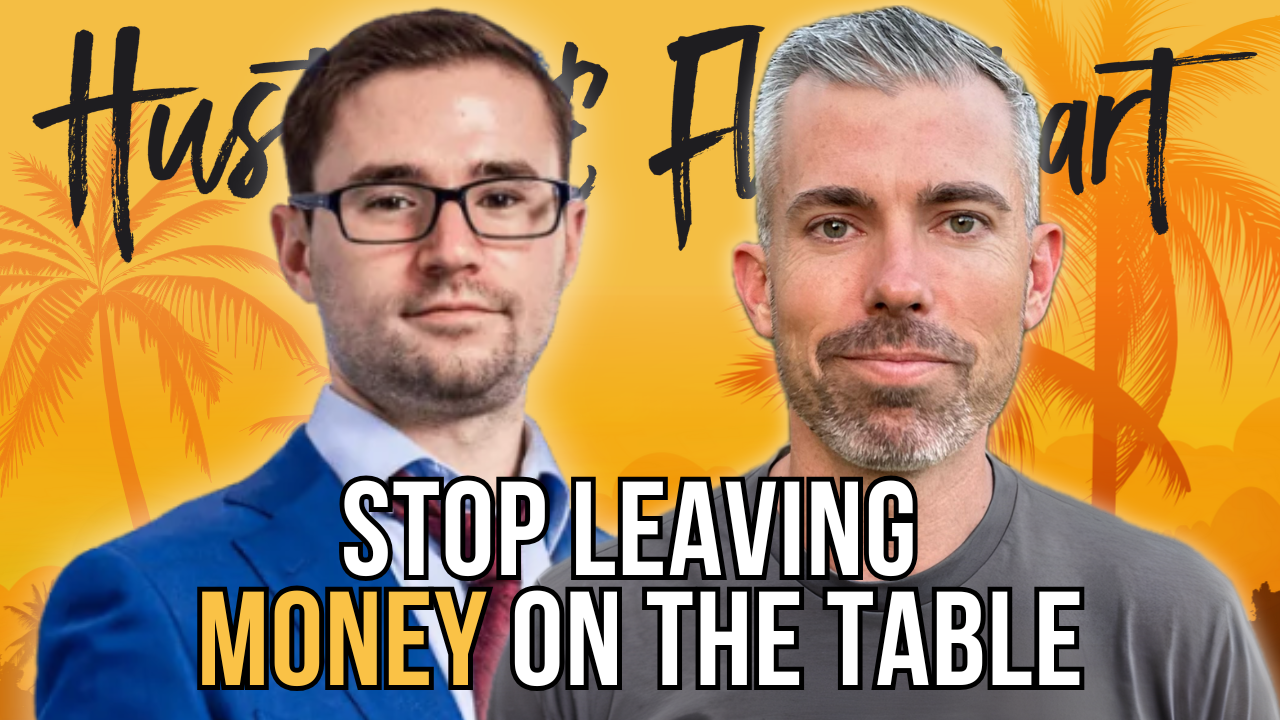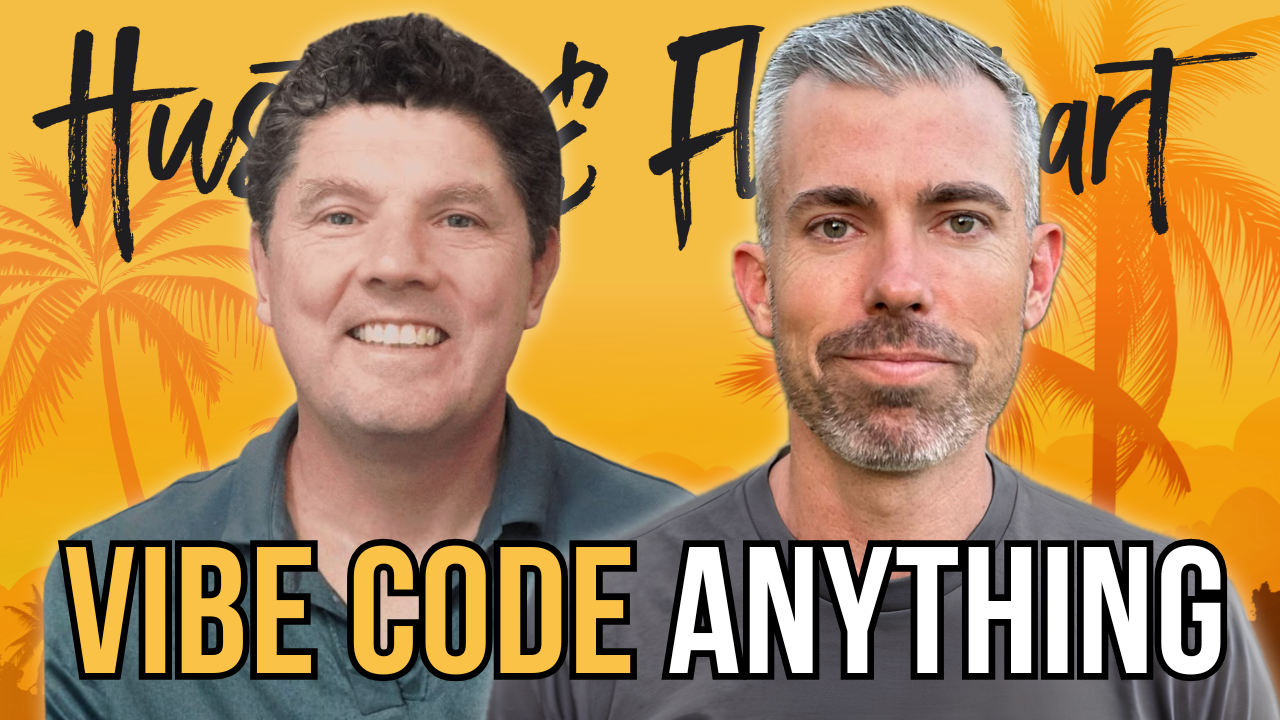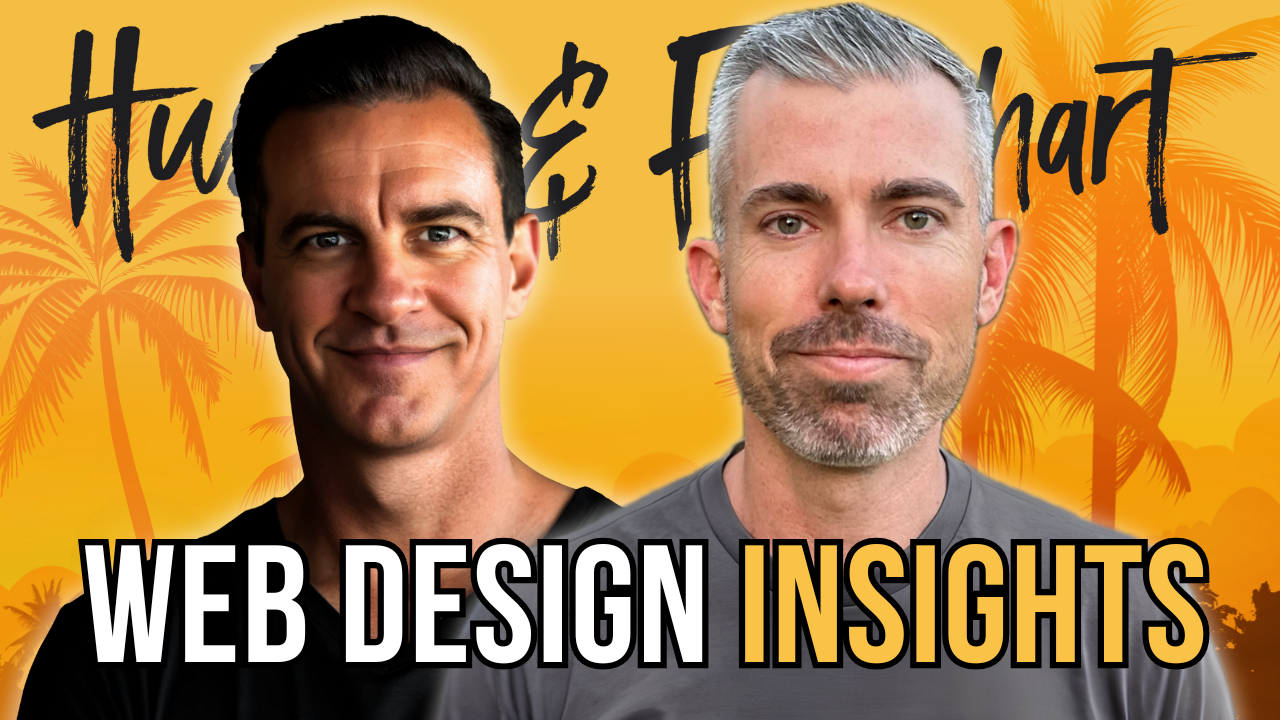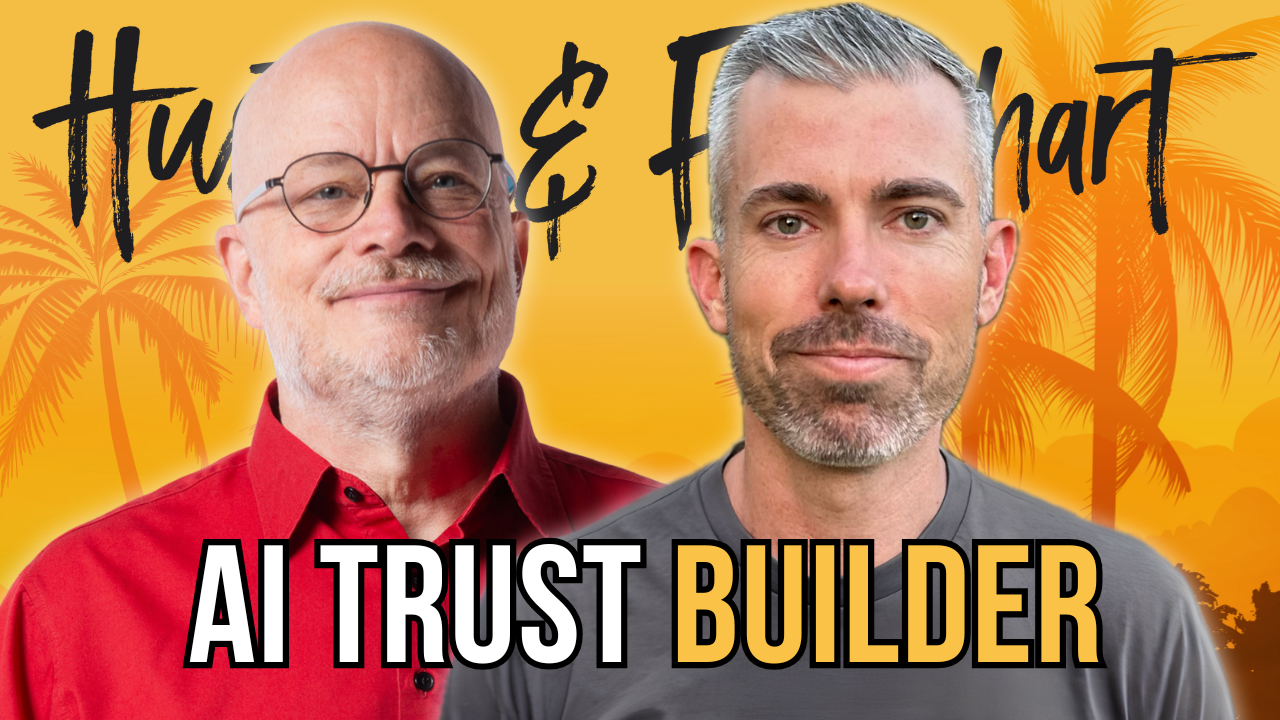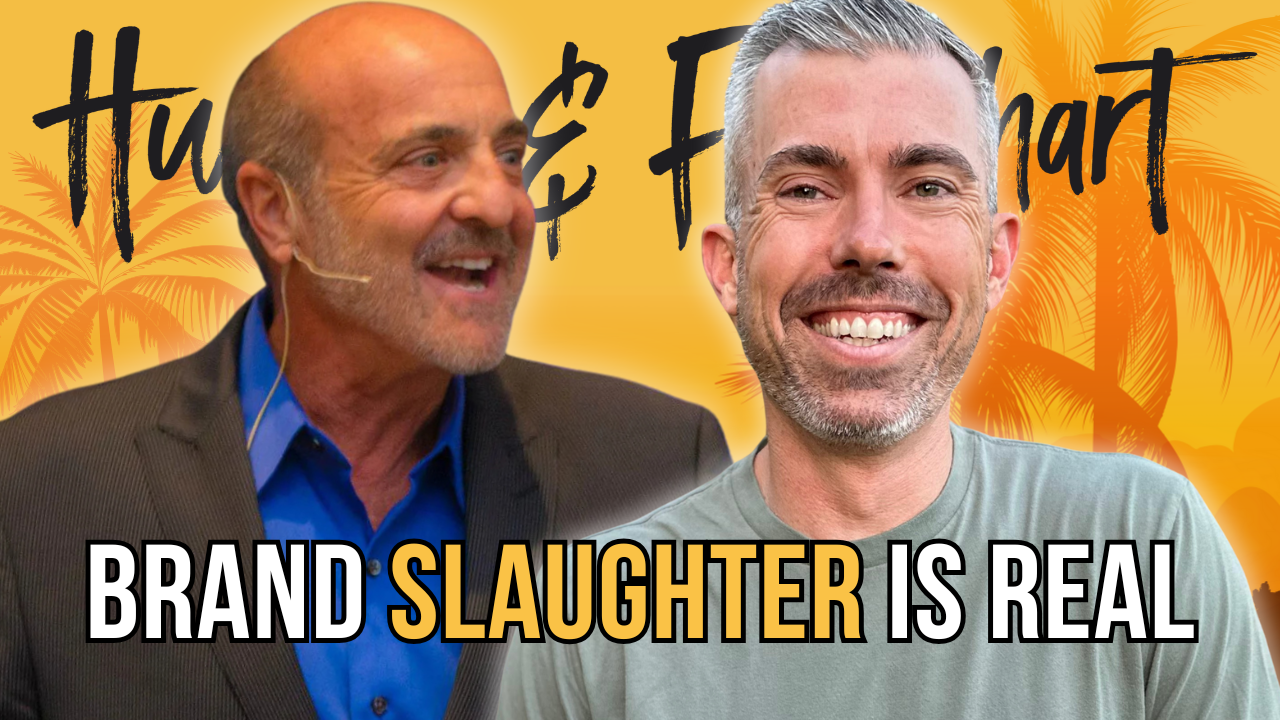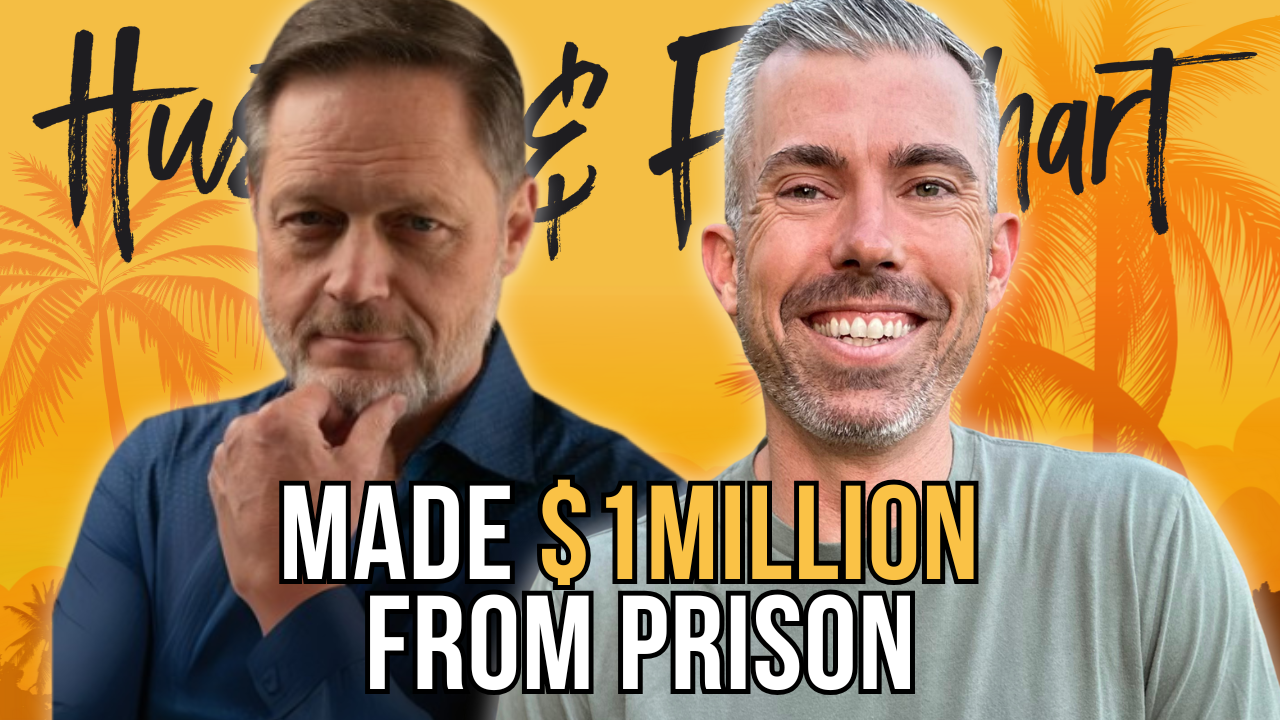What do you do when you discover you’re the newest of seven new chiropractors in a town that only has the capacity to support three comfortably? If you’re Ben Adkins, in just six months you become number one of course!
Ben decided he wanted to pursue a chiropractic career because he had a great one himself who helped him relieve recurring headaches back in 3rd grade. What he didn’t realize when he made this choice was building a practice didn’t automatically mean “they” would come.
With more time on his hands than patients to tend to (or money to market with), Ben focused on learning online marketing strategies to build his local practice. In the process, magic happened. He built a recurring source of mostly passive income helping other local businesses market themselves and discovered the importance of building his own brand while doing it.
Listen in as the guys get the goods on Ben’s four-day product launch process, three-legged traffic strategy, and two monetization models that convinced Ben to shift from spinal adjustments to online teaching as the highest and best use of his time. If brand-building or local business marketing are areas where you could use an assist, check out this chat with Marshall Wayne and this episode with Christine McDannel.
What you fail to realize when you’re young and starry-eyed is that once you get out and open your doors is that not everybody’s just gonna rush through the door.”– Ben Adkins
Table of Contents
ToggleSome Topics We Discussed Include:
- This is how to find the “magic land” of what you’re meant to do
- 8 years is a long time to wait to catch up on a bromance Matt
- Quit trying to be clever and focus on this when deciding to create a product
- Which comes first, building the brand or direct response ads (chicken, egg)?
- Find the niche within the niche to lock in long-term clients on retainer
- Another successful example of going deep not wide, pain points included!
- The guns blazing vs baby steps approach to problem resolution and what you should choose for your particular client getting business model
- Turn a live event into an eternal source of revenue
- 6 days for humankind’s creation…Ben’s got product creation streamlined to 4
- Advisory Warning-this method should only be attempted by skilled professionals
- Does length matter? Your avatar’s answer may surprise you!
- Why being a nerd for “the stuff” is as important as marketing skills
- An underutilized mostly passive income stream to check out for your niche
- Are Matt and Joe getting the band back together?
- A case for using solo ads as your barometer
- What does Frankenstein have to do with a successful traffic strategy?
[adrotate group=”3″]
Contact Ben Adkins:
References and Links Mentioned:
- Closerscafe.com
- ScriptDoll
- Birdsong
- Perennial Seller by Ryan Holiday
- The Game by Neil Strauss
- Marshall Wayne – How To Build A Movie Star Brand For Yourself
- Christine McDannell – The Brick & Mortar Systems Rockstar
- Traffic strategy not in your wheelhouse? Maybe you just don’t want to recreate the wheel and learn how to DIY it? Get your “how to” over at the Advisory.
Subscribe & Review The Hustle & Flowchart Podcast
Thanks for tuning in to this week’s episode of the Hustle & Flow Chart Podcast! If the information shared in these weekly conversations and interviews have helped you in your business journey, please head over to iTunes, subscribe to the show, and leave us an honest review. Your reviews and feedback will not only help us continue to deliver great, helpful content, but it will also help us reach even more amazing entrepreneurs just like you!
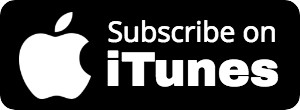

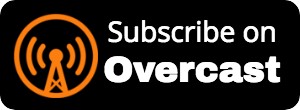
Transcription
Matt: Hey Ben, thanks so much for joining us. How are you doing today?
Ben: I'm doing good. How are you?
Matt: We're doing great. Really looking forward to this one. You and I actually go way back. I think we've known each other for probably seven or eight years now. We did some projects together with Josh Bartlett awhile back, created some content together there and, you know, kind of been in and out of contact over the last few years. So I'm really excited to catch up and find out what you're up to these days.
Ben: I'm excited in terms of Internet stuff, w We're like the old guard. I mean he could really think about it. So, even though it's been a short period of time in the real world, and Internet speaking, we are sort of the old guard. It's nice to get to hang out with friends anytime that you get the chance. So thanks for having me.
Matt: Absolutely. So let's dive in and get a little bit about your backstory. Let's find out how you sort of got into the Internet marketing world and I know you started as a chiropractor or were you a marketer and then a chiropractor and then back to market… Let's hear the progression. Let's hear the story.
Ben: I mean, if I really look at it, I was always a marketer, but I sure didn't consider myself that. I totally fell into this world by complete accident.
Ben: I went to school, I was interested in healthcare and when I was really little I had a great chiropractor that I went through that I was having headaches like the second or third grade and they were really bad and I was going to medical doctors, things like that. And my mom was freaking out and nobody was able to figure out what was going on. And everybody was like, well, he's just stressed. Like I'm a third grader. Stress stress can gonna be right. And so, you know, it was one of those things are always a chiropractor. I think twice in my headaches completely gone and they, they really never came back like that. So, you know, when I kinda got into what I was going to do with my life, health care was the first aid because I really enjoyed helping people in that way.
Ben: And then chiropractics my password. It came back to me and I toured the school and I was like, yeah, this is, this is my path. And so I got into that and you know, what you failed to realize when you're young and starry-eyed is that once you get out and open your doors that not everybody's just going to rush through the door. And you know, I also made the fatal flaw of not, you know, budgeting too much of my startup money for marketing. And so I didn't have a whole lot of cash to go around. I was a chiropractor. I was at a town that had probably seven other chiropractors in a town that probably could only support three. And, yeah. And, what ended up happening was I turned to the only thing I had, which was time and the Internet.
Use Your Time Wisely When You're New Business Is Slow
Ben: And because I wasn't real busy when I opened my door that first week, it was one of those things where I would sit on Facebook and I would test things out and I started really getting into, you know, how to, how do I get the word out without being a shill for my business all the time. And you know, the funny thing that I discovered is I rarely even talked about my business and my business grew with some of the strategies that I use to grow my office. The standard thing that happens and how did, how did I get from there to here? Right. From there, I had all these other local businesses around me. They started saying, Hey, what you're doing seems to be working within like six months. I had a chiropractic practice that was as big as anybody else that was a chiropractor in town.
Ben: And so other people started coming to me, you know, restaurants, lawyers, all kinds of folks. And they were like, how do you do this? And so I started taking on jobs. I had one of these little, you know, agencies, you know, I didn't know it was an agency at the time. I was just like, well, if I'm going to be there, I might as well get paid. And actually I wish that was my idea. My wife said, if you're going to be there and not at home, you better get paid if it's not the practice, you know. And bless her that, you know, so that started that. What ended up happening though is my practice got so busy that I couldn't take on any other clients. And so I thought this was revolutionary at the time. It absolutely wasn't. I started writing down the stuff that I was doing that was working so that, you know, when I couldn't take on a client personally, I can at least sell them something to show them how to do it.
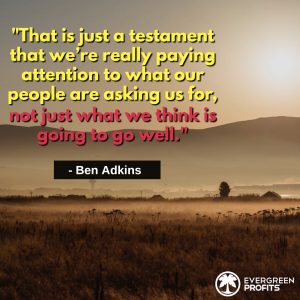
Matt: I love it.
Joe: It's so cool and fascinating every time I talked to, because we have a, we know a lot of chiropractor entrepreneurs that have a very similar story to yours. And it's rare that it's like, it's usually chiropractors that do exactly what you just did. Like they're, they're like scrappy. They figured out the marketing, usually it's online based and then they like, just get so damn busy that they have to shut the practice for the, create some, some online like you just said.
Ben: I tell ya, it was, it was crazy. I ended up hiring someone to help me. And I just, I kept showing up less. It's, I don't think I ever actually quit. I just kept showing up less than one day I looked up and realized that not been there two months and it works out. But yeah, I think the chiropractors, it's funny because you have to sort of be anti-establishment, and entrepreneurial to even think about going into that. So it's funny how your right eye, I know a lot of chiropractors do that have sort of taken that path and I think it's because of sort of what gets you into it in the first place.
Matt: I love that. I love that your main business now came as a byproduct from your other business too. It's, that's something that I feel we, we, we tend to hear a lot with really, really successful businesses is that the business they're in isn't the business they started in the business in spun from a problem they had in the business. They started in, you know what I mean? So like, for you, you started your chiropractic business and then one of the byproducts that you discovered was, I'm really good at putting people through the door into my chiropractic business. I can sell this, you know, with someone like a, Josh Bartlett, a mutual friend of all of ours, you know, he had a, you know, he was putting out products and stuff and he couldn't find a really good way to embed videos that were protected that weren't freely available on Youtube. And he went, this is a pain in the butt, what can I do to solve this? And he made easy video player, you know, it seems like a lot of the really, really great businesses are spun up as byproducts of something else they're trying to do. And then this pivot happens and then all of a sudden you, you know, you, you hit the magic, the magic land of what you were meant to do. Magicland.
Your Clients Will Tell You
Ben: Well, and I think we all wish we were so clever that we could just come up with this stuff off the top of our head. But no, I mean like the stuff that whenever I tried to get collaborate and create something that I think other people will be into, it falls on its face period. And so you just kind of give up on that because the things that really seem to go well, it's exactly what you guys said, it's the problems you're facing every day is you're trying to get your other work done. That's, that's where the cool products, the cool systems come from.
Joe: Yeah. And it's almost like what people are guiding you to do, you know.
Ben: People are yelling.
Joe: Totally. Yeah. It's not even like whispers. It's like, dude, doofus, get over here, stop doing that thing. You're trying. You're pushing too hard. Yeah. I mean, in our scenario, one of the things that people kept on telling us to do is make a traffic course, make a traffic course, make a traffic course. We've made a ton of courses, we've been really good at affiliate marketing and driving traffic. And that was the one thing we couldn't ignore anymore because people kept on coming to us saying, Hey, do you teach how you do this traffic stuff? And that was our latest product and it's probably been our most successful product update date. So, it's just interesting how that works. I do have, I do want to dig in real quick on, on your actual story, what kind of things were you doing to bring people through the door at a chiropractic office? You know, what, what kind of things, how about things that were slightly different than the masses, but the other chiropractors we're doing something.
Ben: It's so dumb, you know, at the time I thought it was dumb. Now I look at, you know, what celebrities do online and what they share, you know, you see these people that have become internet celebrities or they were, they were, they were in one or two movies and they're a huge celebrity online now. And like now it starts to make sense that we've seen this rise, but at the time there was not that many models as to how this works. So I just thought this was strange. So what I was doing is I kind of had a rule because I learned early on this stuff didn't work. If I talked about chiropractic on my Facebook page for my business where I talked about chiropractic on my personal Facebook wall, it didn't really go that well. It's not like people were waiting around to hear that stuff, right.
An Original Brand Builder
Ben: What they were in to was what I was doing with my day. And let me just say, I think I live one of the most boring lives. I think I lived one of the most boring lives back then, but people were sort of into what was sort of the behind the scenes. It was a very voyeuristic type of thing. So what I ended up doing is on my personal wall, I did a lot of hey, this is where I'm going to eat lunch today. And I would take a picture of my food and like, you know, that's the standard. Oh my God, stop posting food. Right. And that was it. And when I would, when I would go to like a chamber of Commerce function or Alliance Club meeting or a charity event, I take pictures. I would talk about it before I went. I take pictures, I've talked about it after.
Ben: And so what was really interesting is I sort of became the promotion engine for the town that I would say. And if you wanted to know sort of what was going on, you paid attention to my page because I was always doing something. And what ended up happening was people without even coming through the door started to say, hey, I feel like I know this guy, you know? And they started sending people my way and we, you know, in the office we'd have something. We'd say, okay, how did you find this? They be like, oh, so and so referred me and I'd be like, okay, is that a patient, you know? And then I'd go look and I'm like, no, it's just a Facebook friend. And Yeah. So on a, on a very personal level, you know, one of the things that we teach a lot of our folks how to do now is just the person that you're working with. Yes you can do all these core things. But just getting them to carry their phone with them and take the occasional picture during the day is extremely powerful because if humanizes things. So that was, that was a very early lesson for me. And at the time I had no idea why it was working, but now where we are with the Internet, it starts to make a lot of sense.
Joe: And, and it's interesting. Yeah, because they're, like you said back then, not a lot of people were doing that. It was maybe like you'd probably get more flat. Like, Hey, what's this guy freaking taking pictures up as you know, as food all the time. You know, what a, what a Weirdo. But now I mean, yeah, and still to this day I feel like a local business or if you're in a niche and you still do that, you kind of share the behind the scenes. It's a branding play. It's making you feel human or human. Well,
Ben: No, exactly. And really interesting story on that. And this is something that everybody can go steal. There was a particular restaurant that I went to at least two times a week because it was sort of the lunch spot, right? And they, they started picking up on this. They started picking up on the fact that I was always there. That was always promoting them without thinking. I was promoting that was always promoting them and they came to me a little bit down the road and said, hey, you're very health conscious, would you like to have your face on a handout that we're doing in the restaurant that's sort of our healthy menu and it'll be a nice, really well put together thing and if you talk about it in your practice and you showcase it's a, we'll put your face on it. And so I had a restaurant, the busiest restaurant in town during lunchtime for the business, you know, crowd that basically had a menu at every register with my face on it.
Ben: And it was one of those, it was just seriously that came about because they started seeing things on the Internet that I was doing and they wanted to, basically leech off what I was doing. And I was more than willing to let them do that because they had a good establishment, number one. But number two, just because I knew that everybody that hit that cash register saw my face and knew where I was. So it worked out really well. And the things that it led to this internet posting my food, the silliness of it led to a lot of things.
Joe: So it seems like you've always had this mindset of like a good blend of not only just direct response because I'm sure that there was a lot of that.
Ben: Oh sure.
Blending Marketing Styles
Joe: But, then you have that branding element where yeah, you can't quite track how many people saw your face and turned into a patient or a client. You bought your stuff, but you like with that perfect blend because this is what we do as well.
Ben: Yeah, and a lot of people get stuck in one or the other. I'm a branding guy. I'm a direct response guy. It's like, dude, mash it together. You know the. The thing about the thing about building a brand is it makes direct response easier if you have a brand where people just recognize your face when they hit your landing page and they see that face. They're like, oh, I know this guy. He does good shit. And that brand supports the direct response. Like it's an, it's sort of intangible. It's really hard to quantify. But we can show that over the years as we focused on growing our brand, our conversion rates also increase sorta proportionately
Ben: Crazy how that works. Right? And that's, that's the thing. And when I started to realize, and I think this was the big take home point, and I still forget this to this day, sometimes it bothers me because I'm like, you have to open up, is I started to realize that if you will just work your butt off to build this celebrity of other people you know, with your core group, then those other people very often will work to build up your celebrity and your brand with their cohort group. And it becomes a very symbiotic sort of thing very quickly.
Matt: Hence, hence the reason we have a podcast. Yeah, there you go. Right.
Joe: That is very true. I was like, yeah, you can go do some content for other people or show a testimonial. But it's like, yeah, podcast is actually the cast all day. I love it. So, so now where are you at and your story and your journey because you've done a lot since that time. You've come from. Yeah, so.
Ben: Yeah, I got into it. I very much started off, you know what I said, I started off teaching people, this is how you build a brick and mortar business, you know, no matter what's your brick and mortar businesses, these are the sort of the core skills that you can apply to that. And what I started noticing along the way, you know, other things became very important, like email marketing and showing, showing other people how I create the, you know, the information products that I put together because that's the other thing that grew out of it. People were like, well, you know, you're putting together these products and you've never really taught anybody how to put together these products, which seems really silly to me. But I started teaching that a little bit and so I got into this sort of community and I started teaching people, Hey, if you want to get into this community, to this information community, this is how you do it.
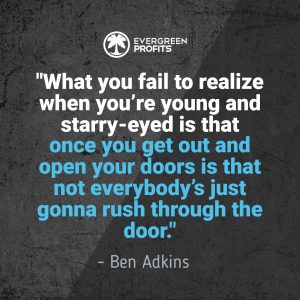
Turn Your Struggles Into Teaching Opportunities
Ben: I'm like, okay, if I'm going back to my chiropractic office, what are the things that I wish were designed for me that would help my office grow, take care of, you know, the stuff that I had to do but didn't want to do and get it going. Like, what would I pay for? Even having a lot of marketing knowledge at this point, what would I still pay somebody to do if I was back in that office? And so we started putting those things together. At first was just sort of for dentists and chiropractors because my wife is a dentist, dental hygienist by the way. So that's another. That's another really important niche for me and then I started having really good conversations with real estate agents and you know, with plastic surgeons and plastic surgeons staff and they were interested. So what I did was I then, this was, this was tough.
Ben: I started looking for something really simple. I was like, what's the thing that I hated to do the most that I needed to do more of? And it was posted on social media every day. I mean like, you know, I'm not always going to a great restaurant writing. I was food, so what is it that I could do so I can post on social media in the morning and the afternoon every day. And I knew that was something that would absolutely help my business. Even back then I knew that, but I didn't have the ability to do it. So what I did was I, I really got simple and I said, what if I could go in and I could put together a 180 social media posts for a chiropractor that were just beautiful and you could put a brand on it for that practice. And you could sit down and you could put down for three months, two posts a day, and you could rotate them after they got to the end of it.
Ben: So two posts a day for three months and at the end it starts rotating back to the beginning. And I thought, would that be something that's super helpful for most of the chiropractors I have. I mean, it's not like a, it's going to get 100 new patients through the door a month, but it knocks out a thing. And what I want, I started finding out was there are chiropractors that I know that we're paying $500 to $1,000 a month for somebody to post two times a week on their social media. Social media managers. Yeah. Yeah. And so what I did was I started going out and that I'm talking to my chiropractor friends from second score. I was like, is this something that you would be interested if I can offer it for 100, 200 bucks a month and two posts a day? And they were like, yeah, absolutely.
Ben: And so yeah. And so I started doing that, I started with dentists, I started doing several of and we built up this nice little agency of just doing super simple stuff like that that people knew they needed to do because it actually does provide a bit of it, even with Facebook sort of knocking page stuff down, it still provides a huge benefit to the business. And we started building up an agency, you know, kind of on the side of 100 to $200 a month clients and you know, right away I'm like okay, well now I have to teach the folks that don't want to be the internet stars, how to do that. And so we started teaching that model of Hey, how do you franchise out social media posts? How do you franchise out Facebook funnels to get people through the door? And what was striking to me is people that had been with me trying to, you know, do certain things for years and they just couldn't quite make it work done.
Ben: Not because of effort, just because it didn't fit their personality. They started taking this particular thing and they were running with it and they were quitting their jobs, you know, so eh, because they had the recurring income coming in and so that sort of, you know, sort of going back to what I wanted as a chiropractor and I wish was there and then you know, proving that model and then giving that model to other people and letting them prove it for themselves. That's where I was like, okay, I really need to put a lot of time in this. And so the last year and a half I've really dedicated myself into sort of building turnkey packages for local businesses that Internet entrepreneurs could go sell them and that's been a really good relationship with me and my customers, but also all of the businesses they serve. So it's kind of that triple win and that's what you're always looking for when you do this.
It's All In The Niche
Joe: Hm. That makes sense. And I think what you're saying and what I'm hearing a lot of is you're just niche and down like crazy. Yes. You're not taking that wide approach that a lot of people that maybe focused just on purely internet marketing, but the fact that this thing stemmed from a necessary, you know, like a need from your chiropractic business, it morphed into still where you still niche down.
Ben: Well, we go super niche too and I think that's the thing most people miss is like we're going into of course chiropractors, dentists and that's pretty niche, but you know, I like if I'm taking on a client or I'm telling other people to what to look for when they look for a client, I'm looking for the chiropractor that is only serving pregnant ladies, you know, or, or knees like it's just the expert at needs. And I think when you start to find people that understand that and as an agency person that has an agency is helping people. When you start finding those kinds of people, those are the people that man, they don't need much help understanding why they need to keep paying you for the next five to 10 years every single month.
Matt: Yeah. And I think there's a simple lesson there that I think is also a very, very important lesson that you went out, you found businesses, you, you sort of knew inside information around these businesses. You knew their biggest pain points and you said, what can I provide for people that's going to sort of knock this pain point away for them and you know, make something monthly off of it. And I think it's, it's such a simple concept, but something most people don't think about. Most people go into things thinking, what can I do to make money? Right? They're, they're, they're putting that as their first focus. What opportunities are out there for me to make money where you took the approach of, okay, I know this industry. What struggles do they have? How do I solve that that they'd willingly pay me for?
Ben: Yeah. And I think that, you know, one of the big things that was going on around the time that I really started getting hardcore this is there was all these people that were teaching, you know, online marketers that, hey, go sell a $3,000 or $1,000 a month Facebook ads package to get patients through the door. Now, don't get me wrong, I don't think there's anything wrong with this, that stuff works. We teach it. But let me tell you, going into a business the first time in pitching that versus pitching something that's 100 to 200 bucks that solves something that they already want solved and saves them money on something they're already paying for to solve that problem. That's the foot the door. And what. So what we found that was so interesting is those particular, you know, customers of ours that were paying us 100 and $200 a month.
Ben: Those are the ones that were picked up the phone because they love what we were doing and say, Hey, do you do this legion stuff? We're paying this other person like a ton of money over here and they're not getting the results we want. We do you do that or would you try? And so that led us to a lot of higher ticket sales because we came through with something that solved the problem that was very much at the core and it's just like you said, solving the problem that was already there instead of trying to come in and invent something.
Joe: Yeah, I mean it's a perfect model to just work them up the ladder, you know, and it's just grew that immediate trust, squash that issue that they had and then take them up the ladder. I mean that's where. Yeah, I think a lot of agencies, because we know a ton of them, we used to be one as well and it's, it's, it's tough when you're out there because like you said, you almost took like the contrarian approach from what you saw. What's the comment?
Ben: I mean, like honestly it came from, came from a stress level thing for me. I just, I wanted something that I could literally make the sale turn on a piece of software to do the majority of the work for me and check in once a month, you know, call them once a month but literally never look at a after that and them still be happy and now let me tell you, it took me a while to figure out how to do that. But once I did, it was something that a lot of people gravitated towards and I didn't have to change my lifestyle to make sure that we were, you know, bringing the heat for somebody.
The Process Of Lightening Fast Product Creation
Matt: Right, right. I love it. Now I'm gonna I'm gonna change the subject a little bit here for a minute. One. So one, one thing that I've always thought about you when I see your name on Facebook and you know, see what you're doing, I'm on your email list. One thing I've always thought about you is that you are an absolute machine when it comes to product creation. There was a stretch where I felt like it was like a year where you had a new course or software or some sort of product, pretty much like every month and it just. And it was all high quality stuff. It wasn't like slapped together, Hey I'm just going to crank you junk out. It was like high quality polished like good shit and it was like really consistent and that's something I want to kind of touch on. Do you have like a system or process or you know, what, what's, what's your kind of strategy behind product creation and you know, what the frequency, all that kind of thing.
Ben: Well number one, I'm not a big believer in putting out a product just to put out a product. I'm one of the big things about actually doing this stuff and the real world is a lot of products pop up and that's the thing. I think a lot of people look at what I do and they're like, oh my God, that stressful. Why would you do that? You know, like why in the world would you put out so many products and the answer if you really get inside of. It's pretty simple. I have a group of people that have started on a path and when they start on that path, like they go do the social content and scheduling stuff for Facebook posts, right? So they start down that path and what happens invariably when they get on that path is they have other, you know, the people that they're working with say, Hey, do you do this?
Ben: Do you do this, you do this? And our, our clients have done the same stuff. Like I wouldn't necessarily teach that stuff, but we start getting people at the help desk. They're like, hey, how do you do this? And so I monitor my support desk really closely and when we get a lot of people that are asking for the same stuff, I will do one of two things. Number one, if we're already doing it my agency, I will, you know the side we're going to do a course so that I can get into how we do the course so fast. It's just a minute because I think that's, that's the most fun part, but number two, if we're not doing it actively, I go find someone else in my group because we have sort of level system in my group and we have people at the top of that level system that are making lots of money every month.
Ben: They sort of added their own flavor to some of the stuff we're doing and so I know I've always got a bed of people that I can go say, Hey, what are you doing over here and could I talk to you about doing a course on this? Because I got all these people asking about it and you know, that happened just recently with a great guy by the name of Gary King. That was what we call one of our black level member she making, but to be in my group, my Closers Cafe group, you have to be a black level. You have to be making $10,000 or more a month. And Gary is, you know, he has this whole system of how he gets clients with the Google map listings. Right? And I wasn't doing that night, so I went to Gary and I said we should do this, and so we put it together.
Ben: Now that's the two ways that I do and I'm either do it my agency, somebody asked, we go teach it and listen to every month somebody is asking, you know, are a bunch of people asking for different stuff. So we'll go do a course on it or I find someone else. Now I think what you're probably wanting to know is how in God's name did we actually put the course together? That's exactly okay. So number one, a lot of practice. I've got a staff that has literally been trained to see an idea that could be profitable and can help people and to put it together. So I'm going to, if it's cool, I'll walk you through the entire process. So absolutely. I would love that because I want to swap it. Cool. Yes, please do. Please do. Because this is my whole thing with this is I always love telling anybody about this because it always comes in.
Ben: If you can put out something fast, you can help more people. Period, yeah, hundred percent. So kinda how we do it is I'll sit down and you know, before a month starts, so like typically around the 15th of the month and I'm saying okay, what are we doing next month if anything and you know, we'll talk to the support desk, will talk to, you know, everybody that's sort of in our organization and we'll say, well people are wanting to know this and I say okay, so we're going to do this like next month we're going to do this on the 15th, we're going to sell it. So typically what happens is, let's say that we go live, we typically go live on with a, with a little mini product launch to our own people on a Thursday or a Friday, right? And so Thursday or Friday it goes live and we'll start marketing this product typically on a Tuesday.
Ben: So we'll start an email sequence to sort of get people's heads wrapped around why this might be important in their life or on the other side of this is important to why they might not need, it, might not be a fit for them, but we'll start building up and then we'll go live on a Thursday or a Friday either with a Webinar or just straight to a sales page selling the features and the benefits and the sections of the course. And of course, you know why they might want to take it. Now, the cool part about it is, is these courses are not done when we sell them. And you know, this is something that we've trained our crew and our crew loves it. I'll go through that in a second live, but the course is typically are not done when we sell them.
Ben: So I don't have to sit around and go crazy with did I do this, did I do this? Video rights is all this the way that it should be. You know, there's a lot of anxiety that comes with course creation. And did you think of everything? And I don't like doing it that way. I like, you know, getting in, selling something during the sales process. If there's something that I forgot to put into the, you know, what should be in the course, somebody will ask me by a, require the email and I can say, Oh yeah, we'll add that and I add it to the sales page as we're going. So when it's all said and done, we typically closed down the cart, you know, we open on a Thursday, Friday, we'll typically close it out on a Sunday or a Monday and then Tuesday I will actually get on and do the course live.
Ben: So I literally sit down with the Powerpoint. I build out typically five sections of what the course should be and you know, any accessory material, I'll build that into that. And that's all being done. Typically wild the sale is going on. Now, of course guys in my head, I already have a clue of what this is going to be because you're, we've got it in our agency or we've done it with our online stuff. But actually formulating into, of course, typically happens over a four or five day period just putting a Powerpoint together. And so what we do, we get done and on a Tuesday I'll go live in for about two to three hours. I will walk people through the process of how to do the thing that they wanted to know how to do when they bought the course. And the beautiful part about that and why people love that I think is because instead of watching something that's stagnant, it's an event, number one, they get to show up and it's live.
Ben: They get to ask questions and I don't think I've ever done one of these. And I've done probably 50 to 100 over the last few years. I don't think I've ever done one of these where I got off of that live call in. Somebody didn't bring something up. That was a question that I didn't really know. I didn't really know beforehand to put into the course because I didn't think it was that important to people. And somebody will say something and I'll say, okay, well let's just hop out of the presentation and let's go live into an internet, you know, a browser and we'll just go do it live. And, and that's what's so nice about teaching stuff that you're already doing is because it's all up there. You just sort of have to know that. So when I get done with that, I pass it off to somebody on my support staff that cuts it into pieces for course.
Ben: And then it gets put into a member's area and then we can basically sell it forever after that. That's what it is.
Joe: Yeah. So are you selling, is it discounted to get first access or is it just, hey, just get first access on this live call?
Ben: If you've bought from me in the past, you're getting the best price. I mean like if you show up to the Webinar on the pitch Webinar or you show up to the sales page, you're going to get the best price. If you act early, if you show up live and even if you don't show up live for the extra training for all of that, you're getting the best price on that seems to work really well.
Earn Before You Create
Matt: And I love, I love the fact that you're creating the sales message before you actually create the course because now you basically use that sales messages like an outline for the course. You're like, well, here's all the features and benefits.
Ben: Exactly and like I said, it works really well if you've been doing this stuff and you already know how to do it, it doesn't work really well if you're having to come up with it from scratch, which I've not ever had to do, but I can see how somebody could fall into that trap, so be careful about that to anybody. Let's. But with the stuff that we do, like I said, with the access to experts that we have, it's not hard to do it at that pace. Now the first time we did this, I'm just going to be honest, I used to have to stretch this actual teaching portion out over three, four weeks. So I would, I used to, when I first started doing this and it wasn't just the course was done in advance, I would have to sell it and three weeks of extra teaching.
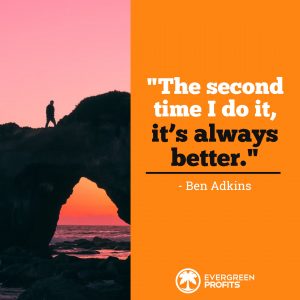
Matt: I love that. Yeah. There's, there's actually two things I want to point out from what you just said. So number one disclaimer, don't do this if you don't know what you're talking about. Yes, please a. I know you just kind of mentioned that, but there's a lot of people, they're like, oh, that's a good idea. Let's go pitch a course on Facebook ads. Oh Shit. Now I better learn Facebook ads so I can teach this course. But number two is I think so many people get hung up on like the length of the course, thinking that that's a benefit to their customers. Right? So many people think I'm going to make this an eight week course because people think it's eight weeks. That's a value add, right, but from my experience that couldn't be further from the truth. People want to get the knowledge you're trying to convey to them as fast as possible.
Matt: Like if you were to put on an eight week course and you were to give it to somebody and say, look, it's an eight week course. It's, I'm giving you two all up front. I bet you if you look at the stats, most people try to rush through that course within a week and not, you know, okay, I'm going to watch week one on week one, week two and week two. Right. We think that like stretching it out is adding value to the customer, but in honesty the customer just wants to get to the meat of it as quick as possible.
Ben: Absolutely. I think this is even snuck into some of the ways that we pitch our products at this point is one of the big things that my customers, my core people love is the fact that I can get through an entire training in an hour. Like that's if I can get through an entire training in an hour. They are ecstatic because they know that they could pick up a skill that they will have for the rest of their lives in a very short time investment and so that's something I've learned too is that sometimes you got to make the course shorter because. No, I think right now, especially with all the distractions we have, people don't want extra weight. They want skills and if you can give them the skill, they're going to rock it and I think a lesson for us sellers out there is the people that have money and the people that are going to be the ones that actually implement what you do and make a lot of money and give you great testimonials are the ones that don't want the big courses. Like if I see something, something of course that's a de-incentive for, I won't buy that.
Spotting Your Next Opportunity
Joe: So yeah. Yeah. And I've, I have a question about on how you're spotting these opportunities. So I liked that you said you're in support often kind of reviewing things. That's, that's pretty much what we do as well. I it's key to have a support person obviously do the majority of the filtering, but what are the things that you're looking out for? So is it like the quantity of time that you see someone say, Hey, I want to learn x or is there some other thinking that goes into that?
Ben: I think that, you know, my greatest skill is not necessarily any marketing scale, it's that I'm a big nerd for this stuff. And so I always sort of have my ear to like, okay, what's, what's the next thing? Is that the next thing because it's flashy and it's going to be fodder for courses or is that the next thing because it's actually going to work.
Ben: And so I'm always kind of paying attention to that on social media and things like that. And so I'm an avid learner and avid reader. It just like you guys. Right? And so that's sort of a big part of it. But the other part is from a social media standpoint that locks that in. But then when I go to my support desk, my customers, when I start seeing something pop up, you know, and we don't have the biggest lists out there, we don't have a ton of customers, we just have very loyal people. So when I see, you know, five to 10 people asking the same question, our initial thing is number one, does this go onto a course that we already have? Is this just a video that needs to go into a course? And then I can say if you're a part of this course, go here because it's in there now or if you're not a part of it, we actually cover it in here.
Ben: Or is it something that is sort of its own course in itself and that takes a little bit of practice to feel that out. But typically on my help desk, it's if we're within a week or two span, if we're seeing five to 10 people saying the same things and asking the same things and that's when we know maybe we should look a little closer to this. Makes Sense? No, I love that. Do. So just out of curiosity, have you ever gone and done one of these pitches before the course was made and went well that wasn't received very well and then kind of just didn't make the course and refunded the people that bought? Have you ever had that scenario? Because I do think that's one of the benefits of doing it that way is you can gauge will this be successful before you even build the course?
Ben: Yeah, I, I've done a few where, you know, it just did not go and you know, there's, there's a couple, there's a couple of weird things about that. Sometimes you're just like, my pitch wasn't great. I didn't explain why they need this. And then sometimes you're like, this was just not a good topic that they were into. It was something I was into, but it had maybe two or three other people were into it, but it didn't, it didn't go. And so what's so nice about that is when you're done with that course, yeah, you didn't make the money that you wanted to make and that stinks, but you always have this little thing that's sitting there that you could add on to another course. And what I found out is what may not be a good they want to pay for it course may be an excellent bonus to something else that really takes people over the top.
Ben: And so a perfect example, I wrote this course called headlines and bullets a little while back. That was all about how do you write really good headlines and bullet points, you know, kind of the core of copywriting. And it just did not go with like, you know, I was just like, well, people are not into copywriting right now as much as I thought it would be. So you know, what was that? That kind of stumped. But what, what I found since we've put that course out is it has been the perfect accessory to other courses where people were like, oh, this is sort of a missing piece that I wish was there. And now they've got that, so instead of me having to cut a new video in the main course that we sold, that did really well, I can just add them to that membership area and it covers that for me.
Joe: So that's cool.
Ben: It's like there's no waste.
Matt: Yeah. So, so even if like a pitch didn't go well, you'd make the course anyway.
Ben: Pretty much. Yeah. There's, there's been one or two times the last five years that I just refunded everybody. And you know, I think that that is just a testament to that we're really paying attention to what our people are asking for, not what we think is going to go well.
On Membership Pricing
Joe: Now you mentioned something really fast, a membership site, so I know a big thing you do is a lot of recurring recurring. So what's your pricing like? How does pricing look for all of your offers that are putting out there?
Ben: So typically if we do something that is like a one time course that doesn't have any recurring element to it, typically I like to live, you know, in the two to $500 range.
Ben: And then we've got, of course, some upper tier things that end up being between the thousand to $1,500 range. So that's sort of the core of that with our recurring. I liked to live, you know, ride around the 99 to $400 a month range. Now, of course, that's very much dependent on what it is. But like, you know, we have a mastermind, it's Closers Cafe and you know, you can get in one way by paying a big lump sum up front or you can pay a monthly and that monthly's typically around $200 a month. But like I said, what's so nice about that is when somebody is putting that kind of money and they're the kind of people that are typically pretty dedicated and they're the kind of folks that are going to end up being partners later on. And I think that's the most important lesson I've learned, marries with recurring memberships. You know, you really have to, you know, bring the heat. Number one, you have to have something that has a ongoing value to it, but you have to, you have to build enough money into this stuff that you can provide value on an ongoing basis. And I think that's where a lot of people missed the boat.
Matt: Yeah. No, I remember you and I, we actually did a little mini training. This is probably five, five years back or so where I kind of picked your brain about your email continuity program that you were teaching at the time. Yeah, I just thought I thought it was an absolute brilliant thing now. Or are you still doing that? The recurring revenue machine stuff.
Ben: I love that stuff. I still do it sort of buy on my own. I don't teach much of it right now. It works, it works, you know, it's one of those things where, you know, if you get the right niche and you're in, you're really an expert at something or you were, you know, can become an expert at something. People will pay you to be on an email list. And you know, for me those are the kinds of things that I charge between 20 and 40 bucks a month for is it's, you know, it's a different sort of thing. But yeah, it's one of those things that I've put out and the people that grabbed onto it grabbed onto it hard and they're still doing this to this day, but the people that were sort of had a kind of a foot in something that was very hard for them.
Ben: And that was, that was hard for me. That was one of the ones that I was like, more people should be doing this is much easier than what most people are doing. And really quick. Can you give us like the, the summary of what that was? I think I kind of remember from what. Sure. Basically what it was is you go into a niche and you get really familiar with what people are talking about and what they want to know more of. Like right now a great. A good example would be, you know, cryptocurrency, that that would be like a primary niche where I would go in and pretty much once a month, twice a month you're writing a newsletter and in that newsletter you give some stuff and it's sort of the latest and greatest in the industry. What's going on, what's the underground stuff, what are people saying, and we did a lot of content curation. I just pulled the experts in that industry and sort of curated the content and that was what it was all about is how do you go into an industry maybe being really interested in and not considered an expert, but curate content from really great experts and put it into a digest that people will pay you 20 to 40 bucks a month for.
Matt: Yeah, I love it. And you're basically. You're basically selling. It is like, look, there's a lot of information out there around, for example, cryptocurrency. There's hundreds and hundreds if not thousands of blogs on it. There's tons of podcast, tons of experts and if you listened to them all, they'll have you know, contradicting beliefs about what you should do. In crypto, you know, we cut through the clutter, we cut through the noise, you know, twice a month we send you an email and we round up the top 10 must read articles around crypto and you're basically for a fee, a small fee, you know, somewhere between 10 and $40, like you mentioned, for that small fee, you're essentially curating the best stuff that you could find and helping people cut through the clutter.
Joe: I love it. Right, exactly. It's so cool that you could just like go into any niche if this is the case with an expert.
Joe: They kind of do all of that work. You bring the marketing power however you want to do it there. And yeah, it's just a cool little side income thing.
Matt: I could see more continuity and it seems like such an easy add on to anything you're already doing in your existing niche as well, you know, it seems like just, you know, you're constantly trying to think of what can I add to my funnel? What upsells, what, what could I add for recurring? That's a real simple one right there. Yeah.
Ben: And that's, you know, my whole thing was how do I feel good about this interest that has nothing to do with my business, you know, and so like as I was nerding out and taking all this time to read all this stuff and this business that I had no clue how to make money and other people were like, oh, that's really cool that you have, would you, where'd you read that? And so that's how that business was sort of born. I was like, well you can pay and I'll just put it in front of you.
Clever Use Of Marketing To Grow Listeners For Your Music
Joe: I liked what you just said there, that whole side, a side passion thing. But I know music is your big thing, right?
Ben: Yeah. Love it.
Joe: So what do you, what are you doing there? Because we're both music guys too. Ya, you are definitely deeper than we were.
Matt: Before you do it. One thing though, so Joe and I, we were both music musicians. We were in bands through, through high school and college and we actually did a little bit of touring and you know, we, we've, we've lived in that world a little bit. We've had like a teeny tiny taste for a minute, but, one thing, knowing what I know now about marketing and online marketing and getting eyeballs and directing attention, it seems like now it'd be such a fun time to be in a band again because I feel like now I've got that skill set to to direct attention and I've seen, I'm seeing you do this in real life like every day on Facebook, you know, you, you've managed to build this platform, you've managed to direct attention and now you're, you're leveraging that for your passion. And I just, I love it. So, I'm just kinda curious about your thoughts and you speak into that for a second. music's interesting because you know, it's hard.
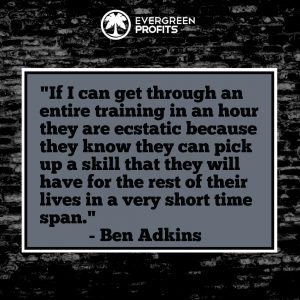
Ben: It really starts to go together. And so what I've done and if you've watched any of the stuff left out with the, with the goofy little music stuff that I do is I have put down a couple of different what I call test flares and you know, there's songs that are sort of different styles of all that I like and that are me. But there are different styles and what I've basically been doing the last little bit is what am I getting the best response to? What are people gravitating towards that they really liked me in that costume? And so, you know, doing a few of those over the last little bit. I have a really good sense now of what the market wants more of from me. And so that's sort of where I'm going now. So this last year I would say it was kind of the testing phase, just like what we do with a lot of the niches we go into.
Ben: I'm trying to figure out what works and then kind of going forward, you know, just, and I think this applies to businesses to going forward the next year, everything that we put out is going to sort of be in that thing. And that I think is where we start to really see some interesting things happen. And I'm like, you guys, I just think it's fun because of the marketing aspect. I love like music, but I really get excited watching how, you know, you can do that even in music.
Matt: I love that you're split testing genres, like who else is?
Joe: I've never heard of that. It's amazing. No. Yeah. So that's, that's really cool. H how much time do you have because we have a couple other points. We don't want to…
Ben: I have a lunch meeting at two that I have to drive to, so I got to be a little quicker. Okay. And I will, I will if you want me, I'll come back anytime by the way.
A Blended Traffic Strategy To Prove Funnel Strength
Matt: Awesome. Well there's one last little rabbit hole we want to go down with you real quick and that's, that's traffic. I think one of the things that we're starting to get known for and one of the things that we teach the most nowadays is traffic strategy and you know, anybody that we can bring on that has traffic skills we like kind of picking their brain a little bit about what they do to drive traffic. So maybe can you touch on like your two or three top traffic methods and we can, we could dive on those for like four minutes and then we'll go ahead and wrap up.
Ben: I will absolutely tell you that how I do it, I love, I will build a funnel, right? So we'll build a sales funnel and if you go to Closer's Cafe right now and you go to opt in to any of the stuff that is there to opt in on a, you will see this funnel that I'm talking about in action.
Ben: We put it on the blog. The blog is a great traffic driver. And you know, it brings in what I would call warmer traffic, but I hate starting with warm traffic. I just hate it. Like I don't think I really learned anything most of the time from warm traffic, I get a false sense of security with warm traffic. I like starting with just the worst possible traffic that you can find. And so I am. And listen, I'm not knocking anybody that does solo ads, so please don't take it as that. But there's this whole solo ad network out there that you can go buy traffic from someone's list, right? And what they do and why, why I call this traffic crappy in most senses, is this, they're not all solo ad traffic is this way, but in a lot of senses, these are people that got people on their list from solo ad traffic and they're selling solo ad traffic.
Ben: So all these people that are on these lists, bless their hearts, are just being passed around like crazy and they're just used to that flow. And so when you buy solo traffic for something real and you put them through a funnel, if you can get somebody to buy in to opt in and to buy with that traffic, that's pretty miraculous. So a lot of my funnels start off with very simple solo ad traffic, the best place that I know to buy it, by the way I buy it from traffic for me, that I know folks over there, they're really good and they make sure that we were not doing something stupid. So I, I buy from there and you know, we'll send traffic to a thing and I get a good sense of like, you know, an optin rate. We typically with the, with the funnel that I told you about it Closers Cafe, the optin rate for that right now because we've worked our butts off on it with cold traffic is, you know, 40 to 45 percent, which I can take, you know, I will tell you that all day and from there, how many of those people were actually buying and buying all the way through the funnel.
Ben: And so that has been something that's the start. That's the foundation for me. From there we'd go to Facebook ads because you can get much warmer traffic even if they don't know who the heck you are, even though it's still cold traffic, it's warmer than the solo traffic, right? Not as distracted. Well that's saying something, but there you go. And then, and then, you know, once we start getting data from the Facebook ad traffic, initially what we do is we take the people that actually went all the way through the funnel and bought and we build lookalike audiences for most folks and so we start finding more people that way. So that's sort of the three layers past that. What I really love is I love the extra indoctrination stuff. Once you start getting that funnel line that with those two sources, that's when you get hardcore on the podcast and that's when you know, you put a commercial in front of every podcast that you've done for the last year for the new thing. Right? And it goes to that funnel and then from there, like we're doing Youtube videos, we're doing blog posts because now we know we've got a funnel that works with, you know, very cold traffic. That's when you start warming up traffic with the other ways that everybody does this stuff different. But that's sort how I it.
Matt: Oh, I love that.
Joe: So that list you just said like what was it like four things? I think that is us up for the next episode.
Ben: Love to spend an entire hour talking about that because you want to talk about stuff that amazes me. That's it, right there Right.
Matt: Oh, we can have a full on discussion about traffic because the thing I love about traffic is everybody has slight variations of how they do it and it works for everybody with how they do it. And I just love hearing everybody's stories around traffic and their tactics around traffic and then making my own Frankenstein version from other people's strategies that's uniquely our own. And so traffic we could probably nerd out for a whole hour episode on that. So I definitely think we should do that. One point I did want to make though, about what you said was, you know, even the worst traffic, the like the solo ad traffic or even, you know, even stuff like pop under traffic and really junk traffic, can actually be warmed up through the power of retargeting. You can ask, that sort of gets people to show a broad interest and then through Google Display Network, through Youtube, retargeting, through Facebook retargeting, you can get in front of that person over and over and over again, very inexpensive extensively. And then essentially those people that was, they started as junk traffic eventually warm up to you and potentially to do more. Well that's the thing these folks are, it's exactly what you said. These folks are so running gun, and they're used to being distracted very easily.
Some Cool Tools From Ben's Marketing Stack
Ben: If one message happens to get shown to them more than once a, it's a whole different ball game. You're absolutely right.
Joe : So, yeah, we'll cut it off here. I know you got to get running. Where can people go check you out? I know you say Closers Cafe quite a bit.
Ben: Yeah. Closers cafe.com. You can pretty much find anything that you need there. That's sort of where I keep my diary of the stuff that works and the stuff that, you know, actually, you know, of the 50 things that we try, the two that actually works, get turned into blog posts. And then, like I said from there, that leads you to all paths to me and you can contact me there and you know, if you have any questions, anybody listening has any questions. I love this stuff. I'd love to talk to you now.
Matt: Now, do you still have a Scriptdoll and Birdsong and some of those other software products?
Ben: Absolutely, and those are. That's what's so great is those are still going strong and just what's the greatest. Those are list building and for Birdsong and copyrighting done for you pretty much with Scriptdoll and what's so great is,
Ben: There's not been really any niche we've moved into where those have played a very significant role and so we've, we've continued to improve those from customer feedback over the last two, three years and you know, just recently we added some new Birdsong updates that completely changed the way that I use the software and it made it a completely a whole different use for me. So I think that's what's so great is it's like you said, when you find a need for something and you build it, typically that need doesn't go away if you built it for those reasons. So those, those softwares are absolutely great for us.
Matt: Love it. We'll make sure to link those in the show notes. There's one question that we forgot to ask real quick. Do you have any book recommendations for our audience that maybe you recommend often? Are you reread once a year or anything like that?
Ben: You know, in the middle of one right now, I'm going through several and one of the ones that I'm going through because I'm really into. I'm writing a couple books right now, which is dumb. Don't write two books at once. But I'm writing a couple books right now and in one of the books that I'm getting into right now is it's called perennial seller and yeah, and it's a, it's a really safe from the same guy that wrote a, you know, trust me online and I'm trying to think of the couple of the others would Ryan Holiday, Ryan Holiday, and Ryan's a great writer, young guy, great writer, but this is basically how to write a book that sells for five to 10 years rather than just being something that's trending right. It's just a really cool concept. So that's the one I'm in the middle of right now. And I'm digging that and I always tell people, you know, this is what I read a long time ago and I get a lot of crap for this, but go read the game by Neil Strauss, which is a pickup book. It's a pickup artist book, but it's, I learned so many interesting marketing things from that and that's when I go back to every two, three years, just because it, it does have some good foundations.
Matt: Love it.
Joe: And it's just entertaining.
Ben: It's super entertaining.
Joe: Yeah, let's be honest. Awesome man. Well thank you so much. And let's do a round two will touch base on that and I appreciate everything, man, and we'll link everything up in the show notes that Ben mentioned for you guys listening and yeah, til next time dude. Thank you.
Ben: Thank you. Appreciate you guys. It's always fun and this was no exception.
Matt: Awesome man. Thanks.
Joe: Thanks buddy.







